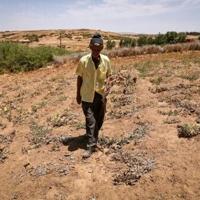In a village north of Morocco’s capital Rabat, Mustapha Loubaoui and other workers wait by the roadside for farm work due to a six-year drought.
Loubaoui, 40, traveled 280 kilometers hoping for work in Dar Bel Amri, a once thriving agricultural village.
However, he returned empty-handed, worrying he may join the 159,000 Moroccan agricultural workers who lost their jobs due to the drought.
He said, “Work is scarce due to the drought.”
Large areas of the Mediterranean are facing drought conditions, particularly in Morocco, Algeria, and Tunisia.
The drought poses a threat to Morocco’s important agriculture sector, which employs a third of the workforce and contributes 14% to exports.
Over one-third of Morocco’s cultivated land is unused because of the drought.
Unemployment rates in Morocco rose to 13.7% in early 2024 due to the drought’s impact on employment.
Chlih El Baghdadi, a farmer near Dar Bel Amri, faced major losses from the drought, leaving him dependent on his wife’s income.
While Morocco has seen growth in agriculture, climate change continues to impact farmers like Baghdadi
The government is aiming to enhance sustainable agriculture with programs like “Generation Green 2020-2030”, but unemployment due to climate change persists.
Despite efforts to develop industrial and service sectors, job creation has not compensated for climate-linked unemployment in Morocco.
Prime Minister Aziz Akhannouch announced plans to create 140,000 new jobs through investment deals in various sectors, but the numbers fall short of expectations.
Farmers like Benaissa Kaaouan express frustration as their fields suffer due to lack of rain, highlighting the challenges faced by the agriculture sector in Morocco.





